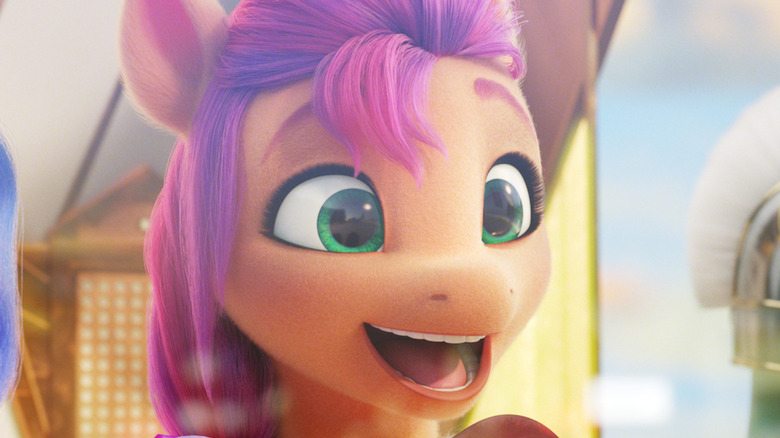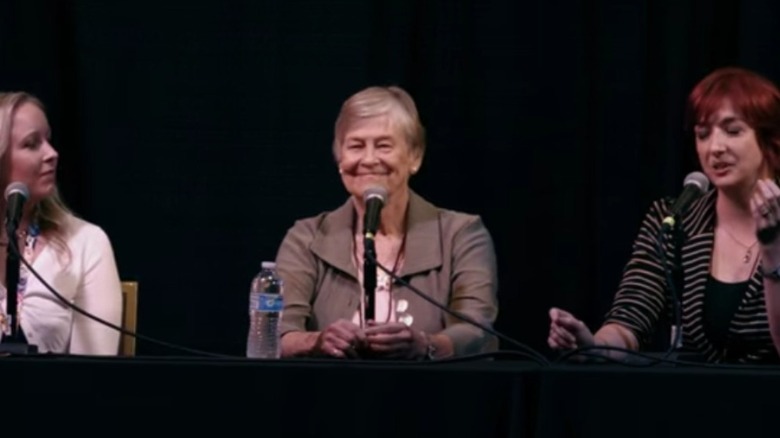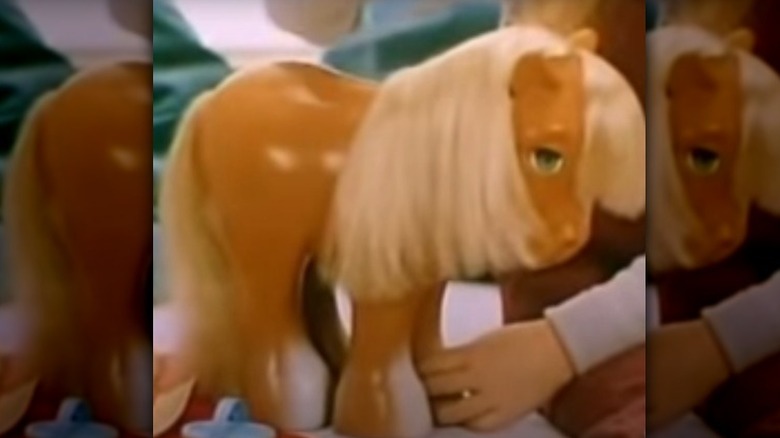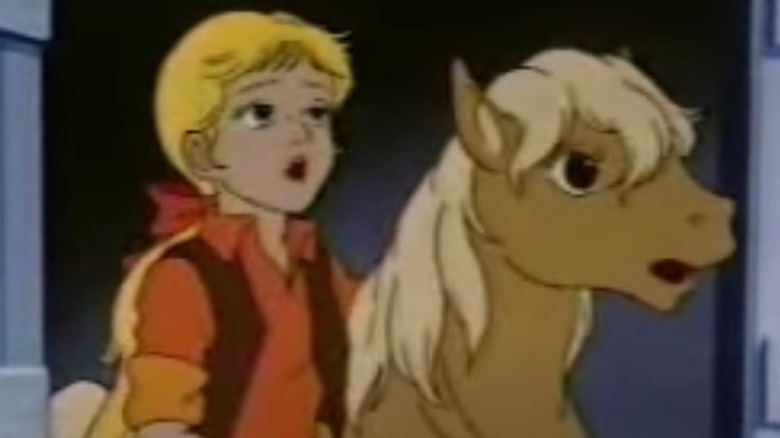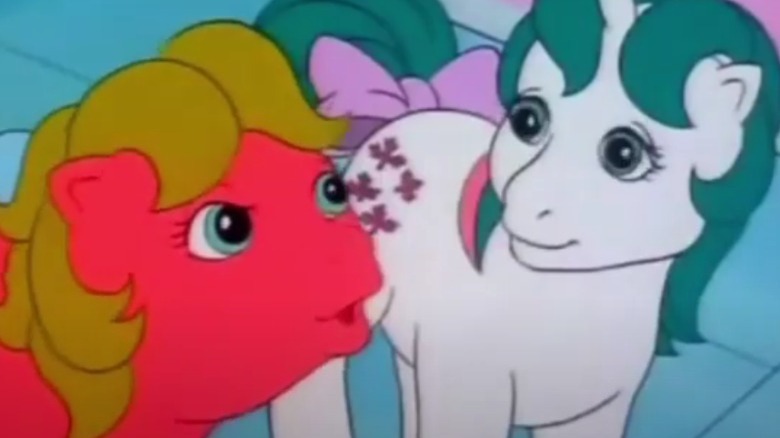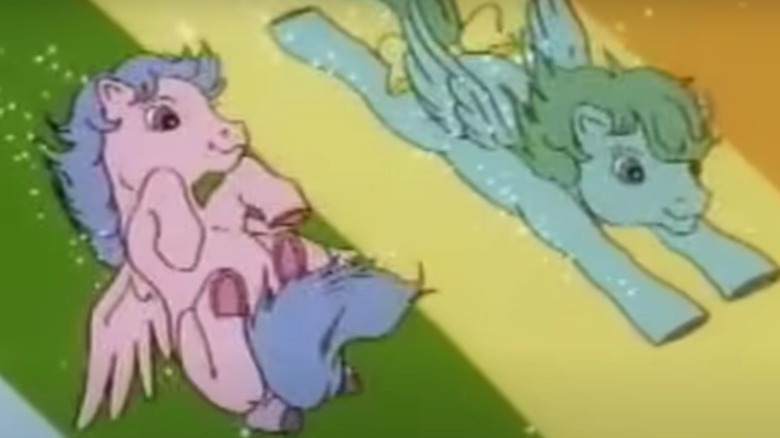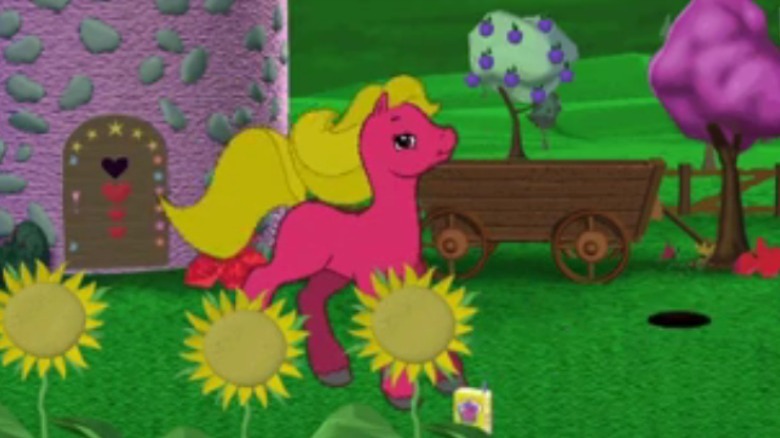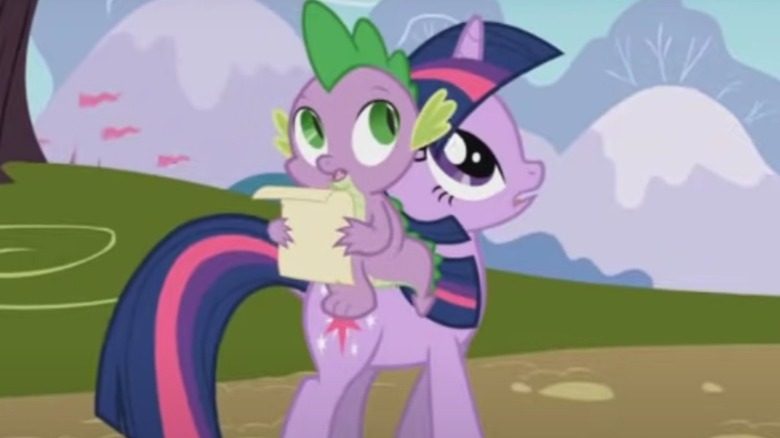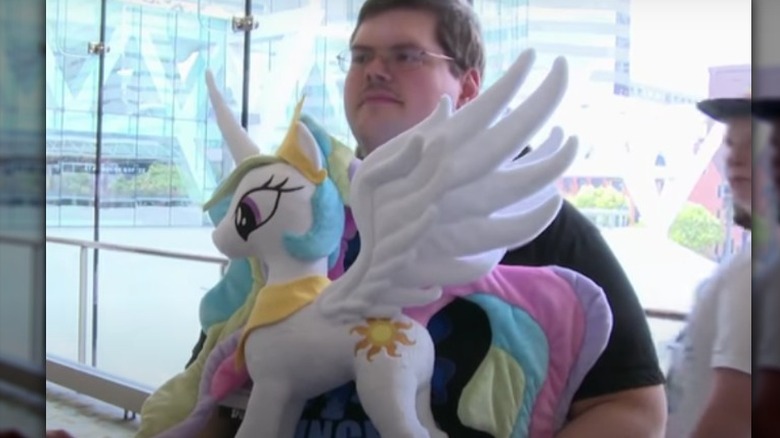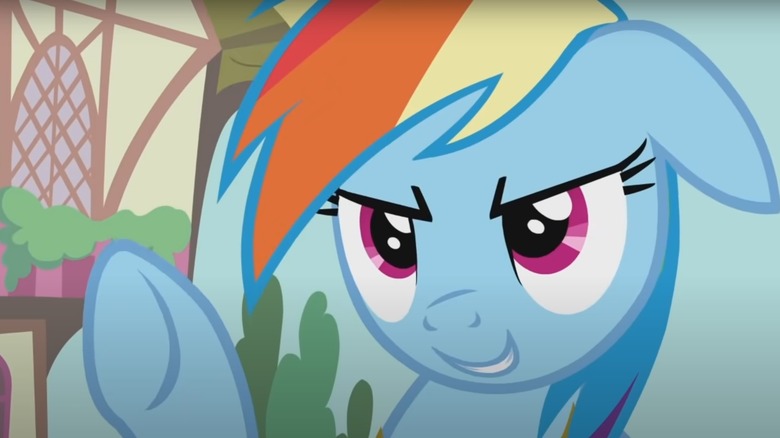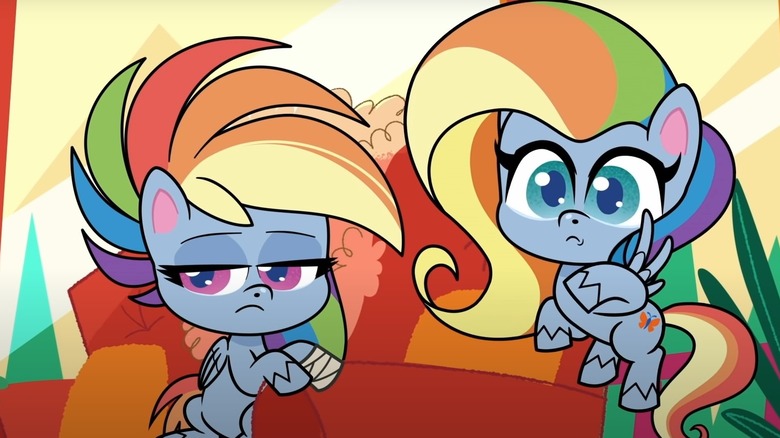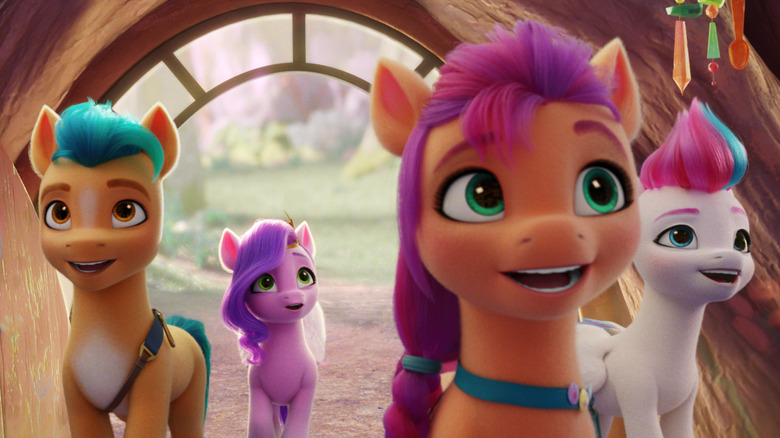The Untold Truth Of My Little Pony
Odds are, if you've been paying attention to cartoons over the last couple of decades, you've heard of "My Little Pony" in some fashion. Whether that's because you watched the original series in the 1980s or because your kids can't get enough of the current iterations in the 2020s (or both), the phrase "friendship is magic" is probably not completely foreign to your ears.
Incredibly enough, the "My Little Pony" franchise began because creator Bonnie Zacherle was a once a girl who wanted a pony of her own. She was working as an illustrator for a greeting card company when she crossed paths with toy creator Hasbro and switched from making cards to coming up with new ideas for toys (per Fauquier Times).
One thing led to another, and several decades later there have been numerous "My Little Pony" TV series, movies, and, of course, lots and lots of ponies. Here's a look at how one woman's idea for a fun set of gender-neutral toys spawned an decades-strong dynasty.
Creator Bonnie Zacherle was inspired by her love of horses
"My Little Pony" creator Bonnie Zacherle always had a thing for horses. She told the Fauquier Times that she was encouraged to become a veterinarian as a child, but she soon realized the field wasn't quite what she was looking for. She said, "I started as a biology major in college and decided it was not for me. I chose to do what I always loved, do what made (me) happy."
It turns out that was coming up with ideas for toys that had the potential to delight generations of children. Zacherle was hired by Hasbro to work on the toy company's development and design team, and in 1981, she came up with an idea that would change everything: toy ponies that have "cutie marks" on their backsides that indicate the pony's emotions or personality traits. She called the idea My Pretty Pony.
Zacherle told the publication that her inspiration for the toys dated back to a childhood wish. She explained, "I got the idea for My Pretty Pony, because a pony was the only thing I ever wanted." She also named the first six ponies herself — their names were Snuzzle, Bluebell, Butterscotch, Cotton Candy, Minty, and Blossom.
My Pretty Pony toy horses kicked things off
It might be hard to believe it now, but when the idea for "My Little Pony" was originally conceived, creator Bonnie Zacherle imagined a series of gender-neutral ponies that both boys and girls would gravitate to. And while it's true that boys and girls like both pink and blue, the original goal was clear: Zacherle wanted to create ponies that appeared somewhat realistic in nature.
The marketing director at Hasbro had other ideas. As Zacherle later explained to the Fauquier Times, she balked when the marketing director suggested making the ponies bright and colorful. Zacherle said, "I initially told my director, 'Get out of my office!' To which she replied, 'Little girls like pink and purple, how about we just test it out on a test group?' I said fine.'"
Of course, the rest is history. These days, toy stores around the world have shelves lined with ponies as brightly colored as the rainbow ... and we all have Zacherle's marketing director to thank for it.
The first TV special got pretty dark
"Rescue at Midnight Castle" was the first animated TV special from the "My Little Pony" franchise. Per IMDb, the animation debuted in November 1986. While fans of the modern films and television shows will likely enjoy the special, it's worth noting that it has a decidedly darker vibe than what you might be used to these days.
As noted by TV Tropes, the original special had some pretty horrifying villains. One villain is Tirac, who uses his Rainbow of Darkness to turn each of the sweet pony heroes into some kind of dragon-esque demon creatures. Eventually the ponies are able to use their own rainbow magic to combat Tirac's, but the dark overtone is still there.
Interestingly, Tirac makes a return in "My Little Pony: Friendship Is Magic," but, much to the chagrin of some fans on Reddit, his name was changed to Tirek.
In 1986, My Little Pony got its first show
The first "My Little Pony" TV show debuted in 1986 when "My Little Pony 'n Friends" was rolled out. Per IMDb, the show produced over 60 episodes and featured a whole host of characters. Common Sense Media offers a review of the series, pointing out that the ponies are most often going up against villains that are similar in nature to those seen in "Rescue at Midnight Castle," including goblins and witches. Despite that, the site says that the violence is minimal and it's likely most kids won't be too scared by what they see.
The 1986 series doesn't come close to offering the same kind of lessons that today's viewers get in newer iterations of the show. As Common Sense Media puts it, that's just how it is — like other characters from the same era, the ponies are "victims of the time in which this series was made."
Marvel helped create the first My Little Pony movie
"My Little Pony: The Movie" was the franchise's first real film, which was released in 1986. The movie pooled the voices of talents such as Danny DeVito, Cloris Leachman, and Rhea Perlman but was critically slammed; the Los Angeles Times, in particular, panned the movie, writing that watching the movie was truly a too-sweet experience that was akin to "being immersed in cotton candy for an hour and a half."
Per Forbes, the movie cost around $5 million to make and ended up earning $6 million, which was a small win for both Hasbro and the studio who helped bring the film to life: Marvel. That's right! According to Mental Floss, "My Little Pony: The Movie" worked with Marvel's animation team for the movie, and it marked Marvel's first theatrical release in the U.S.
Fans who are hoping to find an easy way to watch the original film are in luck; in 2018, it was rereleased alongside the franchise's 2017 "My Little Pony" movie as a double-feature celebrating 30 years since the original's theatrical release.
There was even a My Little Pony computer game at one point
"My Little Pony" was around when personal computers were becoming en vogue for families across the world; the franchise even launched its own video game. "My Little Pony: Friendship Gardens" was released in 1997, and is described as a "Raising Sim" game, which means players are tasked with caring for their very own pony (per TV Tropes). As seen in a video of the game, players could brush their pony's mane and feed it apples, as well as play mini-games.
Die-hard fans of "My Little Pony" especially love the game as it includes Generation 2 characters, which are the only ponies who have not been featured in any of the animated TV specials, shows, or films. TV Tropes shares that these characters include Sundance (who loves to explore), Morning Glory (whose hobby is playing games), and Sweet Berry (a baker).
My Little Pony: Friendship Is Magic revitalized the franchise in 2010
The "My Little Pony" franchise was in need of a boost when "My Little Pony: Friendship Is Magic" premiered in 2010, and the show certainly delivered. Head writer Meghan McCarthy spoke at length about the new show to Nerd Reactor, explaining why it has the ability to appeal to people who were never been fans of the franchise in the first place. For starters, the show just looks good. She said, "I think in general if you're a big animation fan, the show is great looking. I think with each season, it takes animation to a new level that you don't see on TV very often."
It also helps that the show is well-written, and that the team of writers are keeping up with the times. McCarthy also believes that the show is the kind of series that just helps people feel nice while it's on, which goes a long way. She told the publication, "It's not cynical and it doesn't have a bunch of characters yelling at each other. It's characters that you get invested in really quickly, seeing them overcome their flaws to reach their goals."
It seems audiences agree. As noted by Plugged In, the show quickly became a fan favorite. The show had 4 million viewers by the end of its first season, which is impressive — per Plugged In, the series finale of "Mad Men" had 2.7 million.
The franchise has inspired a serious pack of fans called 'Bronies'
If you think "My Little Pony" fans are only young children, think again. The franchise has spawned a particularly dedicated fanbase known as Bronies. Simply put, Bronies are adult men who are big fans of "My Little Pony." As the Daily Beast puts it, there's nothing inherently uncouth about their fandom. The publication explained, "They're not overly effeminate. Many aren't gay. They aren't predatory, or even being ironic. They are just guys. Dudes. Dudes who like 'My Little Pony.'"
As the Daily Beast notes, the origin story of Bronies is pretty interesting. When "My Little Pony: Friendship Is Magic" premiered in 2010, a few men jumped on messaging site 4chan and wrote that the show was surprisingly okay. Over the months and years that followed, more men began joining the channel about "My Little Pony," and a genuine community was formed.
Computer programmer Luke Allen, a fan of the "My Little Pony" franchise, explained to Wired the stages a man typically goes through while on his path toward Brony-dom. He said, "First we can't believe this show is so good, then we can't believe we've become fans for life, then we can't believe we're walking down the pink aisle at Toys R Us or asking for the girl's toy in our Happy Meal." Eventually, the men find themselves marveling over the fact that now their male friends are bronies, too.
My Little Pony released a comic book
It turns out that "My Little Pony" has received more than the film and TV treatments — a comic book was developed too! Writer Celeste Bronfman is the woman behind the "My Little Pony: Friendship Is Magic" comic book series. She opened up to The Beat about what it's like to transition from writing for television to writing for a comic book, explaining that there aren't as many differences as you might think. She said that, for starters, both present information and events in a similar way, noting, "TV and comics are both visual mediums, which means that as a writer you're always trying to tell your story in the most visually intriguing way possible."
Bronfman also shared that writing the series has been a gift during the ongoing global pandemic. She explained, "My Little Pony is full of heart, emphasizes the power of friendship, and when characters make mistakes, they always apologize and forgive one another."
The comics are also exciting for long-time fans of the franchise, as Bronfman explained that readers will be reintroduced to fan-favorite ponies and will also have the opportunity to find out more about what other ponies were like when they were kids.
My Little Pony: Pony Life debuted in 2020
In 2020, "My Little Pony" fans were delighted to learn a brand new addition to the franchise was coming: "My Little Pony: Pony Life." The show airs on Discovery Family, the same network that showcased "My Little Pony: Friendship Is Magic" for a decade. The cast of the show includes some fan favorites from that series, including Tara Strong, who voices Twilight Sparkle.
Strong opened up to Hollywood Soapbox about what she thinks makes the show so special, and it turns out it has a lot to do with the new show's stories and how they are told. She explained, "I think it speaks to people of all color, all ages, wherever you're from. It's fun, and it's whimsical. But it's also meaningful stories. It's something you can sit and watch with the whole family, and it never disappoints with adventures."
Strong also shared that she feels protective of Twilight Sparkle and would never want another actor to voice her — so she was thrilled to be able to return to the franchise yet again.
Netflix released My Little Pony: New Generation in 2021
These days, Netflix is home to the the ever-growing "My Little Pony" franchise with its release "My Little Pony: New Generation," which debuted on September 24, 2021.
Co-director Mark Fattibene explained to Animation Scoop that when it was time to reboot the franchise, there was a lot to consider. For starters, the team wanted to make sure the plot and stories were modern and touched on topics and issues that fans are facing today but in a way that held true to how "My Little Pony" makes people feel. In fact, Fattibene said that was the hardest part of putting the show together, explaining that the team had to "push things as far as we could, make sure it was relatable but still fun and didn't lose any of the essence of My Little Pony."
"The Descendants" star Sofia Carson voices the pony Pipp Petals in the Netflix movie, and she spoke to Collider about her role on the show. She said taking the role was an easy choice for her, especially because the main characters are all females. She explained, "It's so cool that all of our heroines, all of our Pony heroes are females. It's really amazing."
